Return To Khartoum
A few friends and acquaintances have asked, What news of Caroline and Beau?
As well as the sad news about Les recently there's been much happening with my daughter and son-in-law.
Take a deep breath -
About two weeks ago Caroline had an interview by telephone with the British Council in Khartoum, for teaching and examining English.
They offered her the job straightaway - "Can you start Monday?!" crackled down the phone wires.
They realised that was a bit impractical and it became Monday week.
So, the current situation as I understand it (it sounds a bit chaotic) is that she's been frantically packing everything she needs to live in Khartoum and teach English to classes of Sudanese adults, having hardly unpacked everything needed to ride a motorbike across the Sahara and halfway down Africa. The British Council freights that lot to the Sudanese capital in the coming week.
A working visa is organised for a few day's time, for Beau as well (as her accompanying husband). They both also had to dash up to London for medicals, for the British Council medical insurance.
Caroline flies out in the coming week. To a hotel to start with while she finds a flat.
Not to be outdone, Beau has a job at the Khartoum College of Music and Drama but with a more 'African' timescale. That starts in August.
So he stays behind for a while to organise the hundreds of loose ends that will certainly pop out of the woodwork, and will try for a job at the British Council as well if he arrives there before August.
Then there are two Yamaha motorbikes in Nairobi which need to be in Khartoum.
So this blog awaits the exciting report of their return journey along the Trans East-African Highway and back into Ethiopia. Maybe there'll be a hundred miles or more of new tarmac by then - what a disappointing thought!
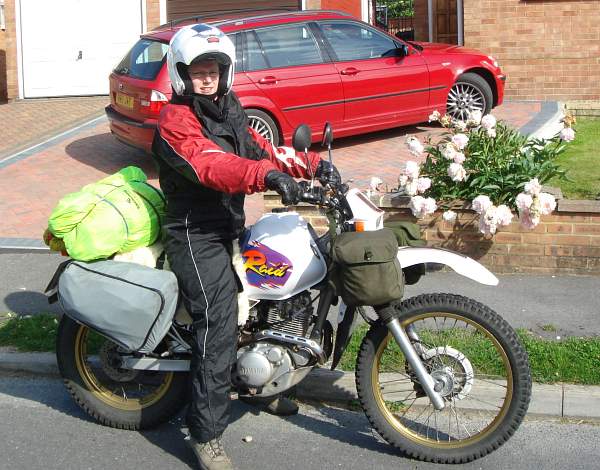
This is one of those bikes. On Day 1.
No photos for this entry, but I'm still sorting through earlier photos. So here are a few from the past.
This is Day 1. Caroline departing Eastbourne, for Dover and The Unknown.
Seven months later bike and rider entered Nairobi.
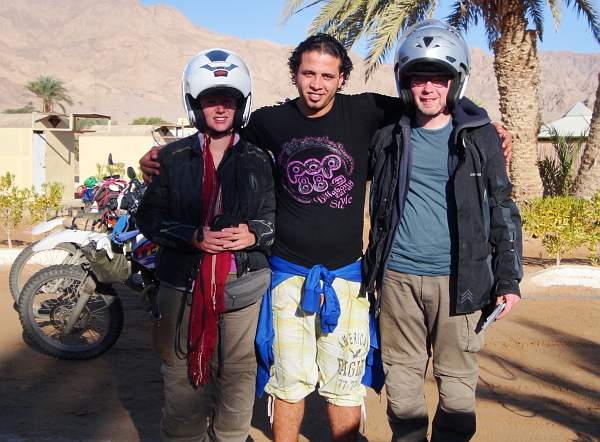
We stayed at Soft Beach Camp in Nuweiba in the Sinai for quite a long while, twice. So we got to know the excellent head waiter in their excellent restaurant.
This was our departure.
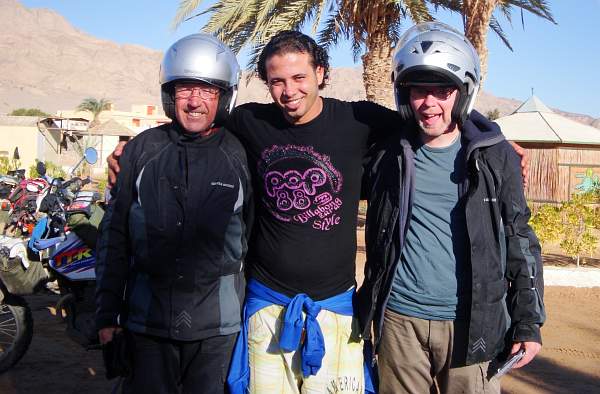
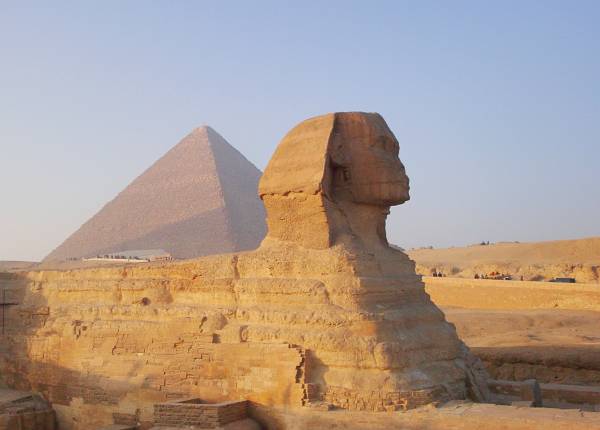
Classic photo of the Sphinx and Pyramid
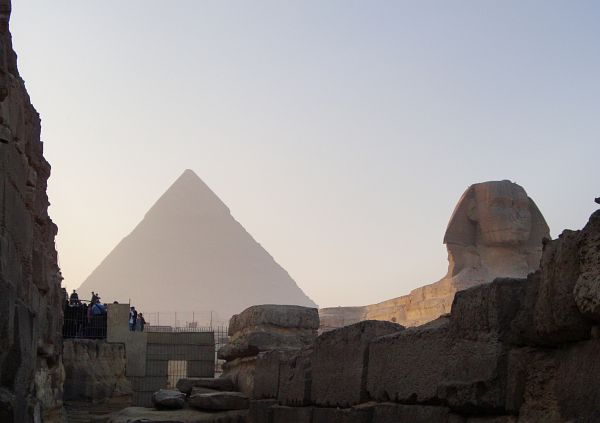
And less usual angle.
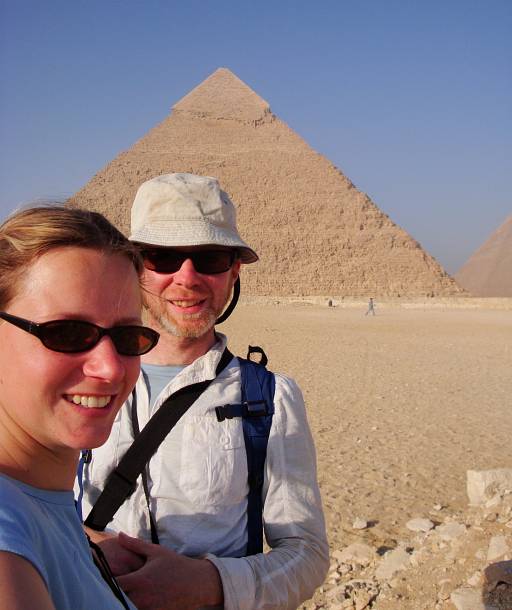
Caroline and Beau at one of the Saqqara pyramids
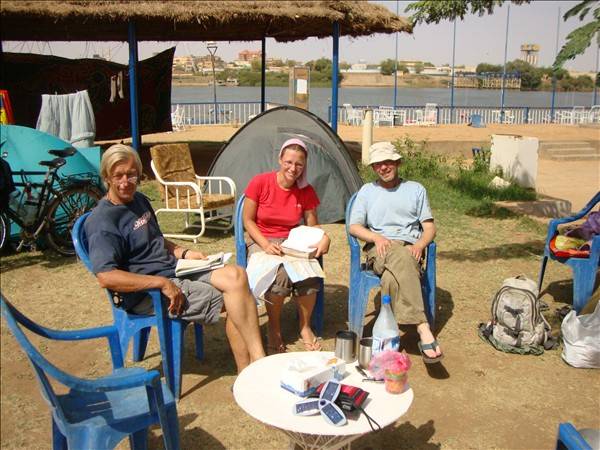
Blue Nile Sailing Club, Khartoum. Where Caroline and Beau will soon be visiting again.
This is they, with one half of an English couple who were travelling south to north.
They gave us the best advice of anyone about travelling through Ethiopia and meeting the people there.
As a consequence we had a pretty good time with all the people we met, unlike many other travellers.
Even just before I left Jungle Junction to come here, a young English couple arrived from the north, saying how difficult it had been in Ethiopia.
They seemed to be quite interested in our experiences and the advice we had been given in Sudan.
More Observations in Kericho.
Here's another aspect of everyday life here. I had noticed that there are sometimes young lads busying themselves in the background behind all the tailors operating their sewing machines on the pavements. Then I noticed bags of charcoal here and there.
The other day I saw the complete picture. In a street out towards the mosque the ironing boards are on the pavement as well as the sewing machines. The tailor's assistant gets the charcoal glowing just right, sometimes with the help of a parrafin blowlamp, and tips it into the top of the iron. When the iron is at the right temperature (one dot for synthetics, two dots for cotton, three dots for linen. Is that right?) the assistant gets to work pressing the suits and dresses that have just left the sewing machine.
Coincidentally, when I looked in an ironmonger's window when out with Nelson the other day, there in the middle were two charcoal irons, a 'standard' and a 'de luxe' version, all shiny steel with brass embellishments. Now that would be a worthwhile souvenir from Kenya, something you definitely can't buy back home (I don't think so anyway).
It's like everything else - who says cordless irons are a new thing?
I have found in all 'third world' countries that ironmongers' shops proliferate in ordinary towns, and are incredibly interesting places to look in. But sometimes it's impossible to do so. Because, immediately identifiable as a western foreigner, you'll be besieged with requests to buy everything there is in the shop, (especially in Egypt) and there'll be insufficient common language to explain 'I'm only looking', or, even more difficult, to explain the thing you actually are looking for if that's the case.
Not so much a problem here as English is pretty universal. Maybe I'll go back to see how much the irons are, but I've nowhere on the bike to put one.
Nor the charcoal.
I did that once in Guatemala where the local ironmongers sold a shower heater that would definitely be impossible to buy in England, or anywhere else in Europe. It was cheap enough but I already had a carpet, a thick bedcover (to be used as a rug) and other stuff to somehow fit on the plane journey home.
Those shower heaters were used everywhere in South and Central America and were known as 'suicide showers', but only by westerners I think.
They have the same devices here in Africa, also on sale in the ironmongers. I won't buy one but here's how they work:
The device is a large-ish plastic shower head with water heater incorporated inside. It fits on the water pipe coming out of the wall and there's an electricity cable connected to it, often with completely bare wires. The holes in the head are tiny so the jets of water flowing out are also tiny. Quite important, that.
And, they are mounted quite high up, so unless you're VERY tall, you can't reach the thing to touch anything. Quite important, that.
Inside, the water flows over coils of bare wire connected to the electricity cable, via a crude switch which detects when the water is flowing.
To use these you just turn the tap on and listen for a 'zizzing' noise, which tells you the electricity is connected to the heating coils inside the head. The noise comes from the 240 volts in these bare coils which are immersed in the water that your standing under, so the electricity buzzes and zizzes as it flows into the water. And the water is heated instantly to quite a good temperature.
Most people know that water conducts electricity quite well, and that will explain why these things need to be fitted quite high, and also why the holes in the shower head are quite small. It relies on ALL the jets of water from the shower head changing into streams of water droplets BEFORE reaching your head, thus not conducting the 240 volts, which would upset your hairstyle if it reached it.
But it's an interesting experience to stand under one of these and raise you hands until you almost touch the shower head, with your fingers maybe one inch from the head itself. Check the nature of the floor your standing on first, that there are no metal fittings around the plug hole for instance. The tingling massage that travels down your fingers is quite something! Very tall people report a similar feeling on the head, especially if the shower is mounted not very high.
I know all this because in that ironmongers in Guatemala, even though I'd told the shopkeeper I'd decided not to buy the shower heater, (because I'd seen something else on his shelves), he let me take it out of the box and read all the fitting instructions (which were quite comprehensive I was pleased to find, having stood under quite a few of these), and look inside the thing as well, being partly dismantled ready for fitting.
Instead, he had a Guatemalan version of Monopoly, called Bancopoly. So we opened that up. It looked pretty fascinating, incorporating a journey around all the highlights of Guatemala, with the money being a pretty good copy of real Guatemalan money. So I bought that instead.
As I said, you find interesting things in third-world ironmongery shops.
Technical footnote:
Although not to western standards, these showers are actually reasonably safe. To be so, they rely on there being no earth cabling in the country's electricity wiring system. So you'll only ever see them in such countries, Africa, and Central and South America as far as I know. It would have been a bit dangerous to have brought one home and fitted it, but I had formulated the necessary circuitry in my head to make it safe before going into that ironmongers to check it out. But the Bancopoly won in the end. Just as well really, because on reflection, the circuitry necessary to make it safe in the UK would also, probably, have removed the tingling electrical massage down the fingertips! But there are plenty of them here in Africa to use.
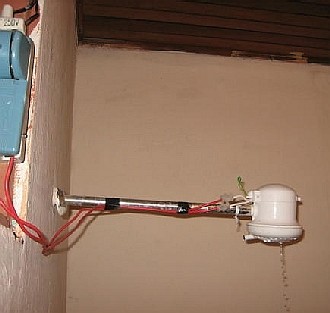
Here's a photo of one.
More stuff in shops:
This is only for those of 'a certain age'.
If anyone mourns the passing of old domestic brand names, many of them are still alive here in Africa, and very popular, sold everywhere.
Lifebuoy soap.
Eno stomach powders (Seen advertised on the TV here).
Omo washing powder.
Tide washing powder (I remember my mum being particularly annoyed when that disappeared from the shelves).
I think that's all Unilever stuff. There are many others that I don't remember right now.
It's raining here as usual, so I'm pretty certain tomorrow or Tuesday I'll return towards Nairobi (where I've heard it has remained dry) and head south for Tanzania. Maybe stop at Jungle Junction again which would be handy as I'll need to do an oil-change around about then.
